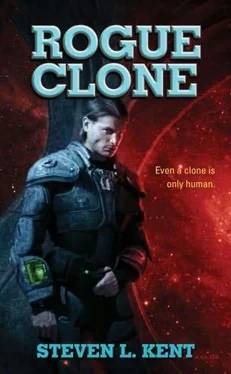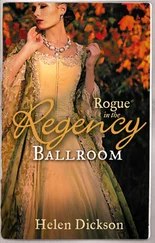Steven Kent - Rogue Clone
Здесь есть возможность читать онлайн «Steven Kent - Rogue Clone» весь текст электронной книги совершенно бесплатно (целиком полную версию без сокращений). В некоторых случаях можно слушать аудио, скачать через торрент в формате fb2 и присутствует краткое содержание. Жанр: Боевая фантастика, на английском языке. Описание произведения, (предисловие) а так же отзывы посетителей доступны на портале библиотеки ЛибКат.
- Название:Rogue Clone
- Автор:
- Жанр:
- Год:неизвестен
- ISBN:нет данных
- Рейтинг книги:3 / 5. Голосов: 1
-
Избранное:Добавить в избранное
- Отзывы:
-
Ваша оценка:
- 60
- 1
- 2
- 3
- 4
- 5
Rogue Clone: краткое содержание, описание и аннотация
Предлагаем к чтению аннотацию, описание, краткое содержание или предисловие (зависит от того, что написал сам автор книги «Rogue Clone»). Если вы не нашли необходимую информацию о книге — напишите в комментариях, мы постараемся отыскать её.
Rogue Clone — читать онлайн бесплатно полную книгу (весь текст) целиком
Ниже представлен текст книги, разбитый по страницам. Система сохранения места последней прочитанной страницы, позволяет с удобством читать онлайн бесплатно книгу «Rogue Clone», без необходимости каждый раз заново искать на чём Вы остановились. Поставьте закладку, и сможете в любой момент перейти на страницу, на которой закончили чтение.
Интервал:
Закладка:
“I should have thought that was obvious, Harris. He’s with the Unified Authority. I defected to the Confederate Arms. We were on different sides.”
“Get specked,” I said, slumping over on my back.
“I brought you a present, Harris.”
I did not respond.
“You can break these if you want, but I went to a lot of trouble to get them for you, so don’t expect me to replace them if you do.” He tossed a pair of mediaLink shades in through the bars.
“Bryce said you liked to keep up with current events. There should be some dandy news for you to follow over the next few weeks.
“And don’t bother trying to send messages out on those. I had the sending gear disabled.” With this, Halverson turned and left.
“You were stupid,” I yelled as he reached the door to the brig. “Killing Admiral Klyber was a stupid mistake.”
Halverson paused. “Why is that, Colonel?” he asked.
“Huang already planned to replace him with …”
“With Robert Thurston, no doubt,” Halverson said. He watched me for a moment with that implacable smile, and then he left.
Sam, who remained just outside the bars of my cell, continued to stare at me with those narrow green eyes that looked both alert and angry. Sometimes he looked like he could barely control himself. “If you break the lenses, they’d make real sharp blades. You might be able to save us some trouble and slit your own throat with ’em,” he said. “I’d like that.” Then he favored me with his backside, leaving me to pick up the shades.
I picked them up and turned them over in my hands to examine them from every angle. This was an expensive pair, far more stylish than the plastic shades I took from the late Derrick Hines. These shades had gold wire frames and honest-to-goodness glass lenses that automatically adjusted to ambient light levels.
The strip along the bottom of the lenses with the microphones had been removed. When I slipped the shades over my eyes and jacked in, I saw they had been hobbled so that the sending functions no longer worked. The browsing functions worked well however.
We were somewhere in the Norma Arm. Not only could I browse the Unified Authority-approved channels, I also found local broadcasts that were banned and filtered out of the U.A. media. Calendars were everywhere on the Link, and I knew that it was now March 26. Eleven days had passed since Bryce Klyber’s death. Thirty-six hours had passed since the attack on New Columbia. It was here that I watched the video feeds of the attack on New Columbia. I got to see how both sides reported the battle.
The big story on the U.A. feeds was the unveiling of the Doctrinaire . Admiral Huang, now officially the highest-ranking man in the Navy after Klyber’s death, could not have been any better suited for the role of tour guide. He began his tours by telling the press how the late Fleet Admiral Klyber conceived the project and spearheaded the construction of the ship.
Huang escorted a large group of reporters on a tour of the Doctrinaire . He charmed them with his enthusiasm as he led them into battle turret after battle turret, then showed them the observation deck from which they could view the rest of the ship.
Huang did not reveal classified secrets like the dual broadcast generators, but he highlighted many of the obvious innovations. No reporter could possibly have missed the four launch tubes that ran the length of the hull of the Doctrinaire , so Huang talked about the fighter squadrons at length. He pointed out that most fighter carriers had a single tube and a compliment of seventy Tomcat fighters. The Doctrinaire , with its four tubes, had 280 fighters. With their rounded antennas’ the new shield technology was impossible to miss; so Huang told the reporters about the rounded shields and gave a cursory explanation about the technology that made them possible.
As Huang finished speaking, he was joined by the other Joint Chiefs and several senators. Hundreds of reporters sat in folding chairs, the way they might have attended the unveiling of the old Earth-bound battleships five hundred years earlier. They would have fit more comfortably in one of the ship’s briefing auditoriums than on the observation deck, but Huang saw a great photo opportunity and had the media sense to take advantage of it.
This was a side of Huang that I had never known about. He stood behind a small podium looking absolutely resplendent in his white uniform with its many medals. He and Halverson had the same number of gold stripes across their shoulder boards—three, but Huang cut a more commanding figure with the gray in his hair and his athletic build. Huang and Halverson were about the same age, but Huang wore it better. Huang looked like a middle-aged man. Halverson looked like a man closing in on his sixties.
Smiling pleasantly, Huang opened the floor for questions, and every hand shot up. Reporters clambered for his attention until he finally selected a man near the front of the audience.
“This is unquestionably an amazing ship. But it is still just one ship. How can it possibly fare against an attack force like the sixty-five ships that sacked New Columbia?”
“Excellent question,” Huang said. “We have arranged a demonstration to address that very point. If you are not satisfied after our demonstration, we can discuss it further.”
Every reporter’s hand went up again. Huang selected a woman from the front row. “Can a ship this size self-broadcast reliably?”
“I think Admiral Klyber struggled a long time with that question,” Huang said. “The engines on this ship are perfectly reliable. We have tested them thoroughly …”
“Didn’t Admiral Klyber die in a broadcast malfunction?” the reporter followed up her own question.
“An unfortunate irony, if you like,” said Huang. “The broadcast equipment in this ship is completely stable.”
The reporters raised their hands. Huang selected his next inquisitor.
“Admiral Klyber was going to command this ship, was he not? Who will command it in his place?”
“Admiral Klyber never intended to command this ship. He was a fleet admiral, you know. You don’t assign a fleet admiral to a single ship. Rear Admiral Robert Thurston was selected to command the Doctrinaire while Klyber commanded the entire fleet.”
“Rear Admiral Thurston?” the reporter asked quickly, before Huang could open the floor for the next question. “The commander of the Scutum-Crux Fleet?”
“Yes,” said Huang. “As you may recall, he commanded our forces to victory at Hubble and Little Man.”
Thurston stepped onto the dais in his whites. A few of the less experienced reporters, the ones who had never seen Thurston, laughed or gasped at his youthful appearance. Short and skinny, with spiky red hair and an adolescent’s face, Robert Thurston always looked out of place in his uniform, especially standing next to a seasoned officer like Huang. The senators at the back of the dais looked like they could have been Thurston’s grandparents.
The questions continued for ten more minutes. The session would have gone on for hours had Huang allowed it, but he had promised a final demonstration.
“Ladies and gentlemen, I suggest you prepare yourselves. We are about to enter a war zone,” said Huang.
Smoky-colored tinting appeared in the glass ceiling and walls of the observation deck turning them opaque. The reporters spoke nervously among themselves as they saw the muted flashes of lightning all around them. It was one thing to sit in some comfortable commuter craft and pass through the Broadcast Network. This was raw. Here they sat on folding chairs on the glass-encased deck of a monolithic battleship while millions of volts of electricity danced on the glass just above their heads.
Читать дальшеИнтервал:
Закладка:
Похожие книги на «Rogue Clone»
Представляем Вашему вниманию похожие книги на «Rogue Clone» списком для выбора. Мы отобрали схожую по названию и смыслу литературу в надежде предоставить читателям больше вариантов отыскать новые, интересные, ещё непрочитанные произведения.
Обсуждение, отзывы о книге «Rogue Clone» и просто собственные мнения читателей. Оставьте ваши комментарии, напишите, что Вы думаете о произведении, его смысле или главных героях. Укажите что конкретно понравилось, а что нет, и почему Вы так считаете.












